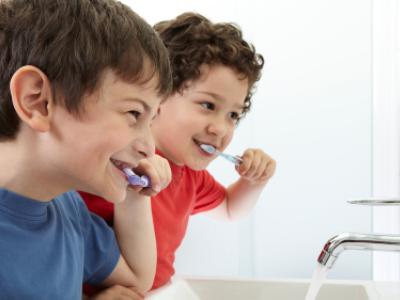Tooth Protection
 |
Fluoride:One of the most effective ways for protecting a tooth from dental caries is the presence of fluoride during development which aids in forming the most acid resistant enamel possible. The best way to receive proper fluoride is through fluoridated water. If fluoride is unavailable in your drinking water (private well, etc.) the fluoride supplements can be prescribed by your dentist after the amount of natural fluoride in the drinking water has been determined. Other forms of fluoride can be recommended for protection of teeth which are already present in your mouth. Your dentist can best advise you of the need and type of fluoride therapy recommended. |
Sealants:The biting surfaces of the back of the teeth form with many deep pits, grooves and fissures. Often it is impossible to remove the plaque from these crevices by tooth brushing and decay is ultimately the result. It is possible to place a protective plastic coating in these crevices and over the biting surface to prevent bacteria from growing in these areas thus preventing decay which otherwise can’t be prevented. Your dentist can advise you which teeth are prone to decay and would benefit from the plastic “Sealant”. |
|
Oral HygieneOne way to prevent dental disease is daily plaque removal. Not just “toothbrushing” or “flossing” but Tooth Cleaning which is total plaque removal. Plaque accumulates on the teeth immediately after they erupt. Therefore, the cleaning of an infant’s teeth should begin as soon as the first tooth erupts. This should be accomplished in a comfortable place such as the couch, living room floor, etc. and NOT in the bathroom. The infants head should be placed in the parent’s lap. The tooth or teeth may initially be wiped clean with a clean wash cloth or piece of gauze wrapped around a finger. A small soft bristled, moistened toothbrush may be used. Toothpaste, however, should be avoided because the foaming action and taste may be disagreeable to the infant. The teeth should be cleaned at least once daily, especially prior to bedtime. Frequently just before bedtime can be a difficult time due to a parent’s fatigue and and infant’s irritability. Therefore, a thorough cleaning following an infant’s last meal of the day is recommended since it may be more suitable and pleasant for both the parents and the infant. As more teeth erupt, the teeth may begin to contact one another. When this occurs, plaque can only be removed from between the teeth by flossing. Flossing aids are available and your dentist can recommend a proper flossing technique. For further information regarding tooth cleaning technique, positioning and recommendations for infants and young children, please feel free to contact Dr. Merritt’s office for more information. |
|
Nursing CariesNursing caries is a type of severe dental destruction seen in infants and young children which primarily effects the upper front teeth in the beginning, but which an effect the rest of the teeth in later stages. The cause is improper feeding habits during infancy and early childhood. The most common feeding practices responsible are: 1. Putting the child to bed with a nighttime or naptime bottle. 2. Allowing the child to have a bottle as a pacifier. Although sweetened beverages (Kool Aid, Soda Pop, Sugar Water, Etc.) have been labeled as “culprits”, milk and formula can be just as damaging since they ALL contain sugar which the bacterial plaque can transform into acids. The above practices are as potentially damaging as constantly snacking on sugar foods! The same type of destruction can be seen in breast fed children once the teeth have erupted and results from frequent and prolonged feedings as well as sleeping with the child who “feeds” all night. Breast milk has more sugar (lactose) than either formula or cow’s milk! |
|
PreventionTo avoid nursing caries, the following recommendations are offered: |
|
Bottle Feeding1. Avoid bedtime and naptime bottles. (If already doing so, use only water). |
|
Breast Feeding1. Avoid frequent feedings once the teeth have erupted. |
|
